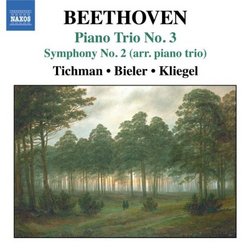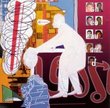| All Artists: Beethoven, Xyrion Trio, Tichman, Bieler, Klieg Title: Beethoven: Piano Trio No. 3; Symphony No. 2 Members Wishing: 0 Total Copies: 0 Label: Naxos Original Release Date: 1/1/2009 Re-Release Date: 6/30/2009 Genre: Classical Styles: Chamber Music, Historical Periods, Classical (c.1770-1830), Symphonies Number of Discs: 1 SwapaCD Credits: 1 UPC: 747313025572 |
Search - Beethoven, Xyrion Trio, Tichman :: Beethoven: Piano Trio No. 3; Symphony No. 2
 | Beethoven, Xyrion Trio, Tichman Beethoven: Piano Trio No. 3; Symphony No. 2 Genre: Classical |
Larger Image |
CD DetailsSimilar CDs
|
CD ReviewsYouthful Beethoven, and Beethoven the Arranger J Scott Morrison | Middlebury VT, USA | 07/02/2009 (3 out of 5 stars) "This issue is part of the continuing series of discs devoted to Beethoven's piano trios. The Xyrion Trio is a fine German group; interestingly, the Trio is comprised of one German who studied in the US and two Americans long resident in German, confirmation that we live in a global musical culture.
The one Trio on this disc is the third Beethoven wrote, Op. 1, No. 3, and although it is probably the most advanced of the three very early piano trios, it still sounds a lot like Haydn or one of the Mannheim composers that preceded Beethoven on the musical stage. There are even, as in the earlier Opus 1 trios, examples of the famous 'Mannheim rocket'. It is trifling music, at least when compared with Beethoven's mature trios, but it is nicely played here. In addition there is a single movement, the Allegretto in E Flat, Hess 48, that is from even earlier in Beethoven's career, about 1790 or 1791 when Beethoven was still living in Bonn. It is both formally and harmonically fairly primitive. The most interesting item here, but one that ultimately disappoints, is Beethoven's own arrangement of his Second Symphony for piano trio. It was made for Beethoven's early patron, Prince Carl Lichnowsky. The first movement comes across pretty well, but the larghetto slow movement has to make allowances for the lack of sustaining ability of the piano's tone and perhaps this is why it is played a bit faster than the orchestral original. This etiolates the movement's delicate melancholy. And frankly in the Scherzo I miss the marvelous conversational wind passages which here are generally given to violin and cello. The Finale is very satisfying on its own terms. One cannot argue with the playing of the fine Xyrion Trio (although I do wish they had chosen to play the Larghetto a little more slowly). This is not my favorite of the series so far, but that's mainly because the quality of the music itself is a bit of a letdown. Recorded sound is lifelike. Scott Morrison " |



